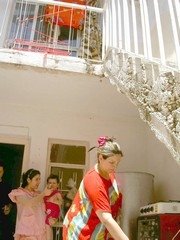 A displaced Christian family in Kurdistan.
A displaced Christian family in Kurdistan.ARBIL, 29 Aug 2006 (IRIN) - Kurdish officials in Iraq's northern Kurdistan Region have unveiled plans to build a camp for some 6,000 families who have abandoned their homes in southern and central Iraq to resettle in the north since the fall of Saddam Hussein's regime in 2003.
"We will build a camp in Suleimaniya for those people who are moving here from the south and they will be considered as IDPs [internally displaced people]," Tavga Omar, general director of the Kurdistan regional government's Human Rights Ministry, told IRIN.
"The purpose of setting up the camp is to easily provide services for them in one place and also protect their rights as IDPs," she said.
The camp in Suleimaniya will be the first of its kind for displaced Iraqis in the north.
Tagva said she was concerned over the increasing number of people heading to the Kurdistan region, adding that the government "cannot cope with this increasing rate".
"There has been a considerable increase in the number of people coming to Kurdistan over the past year, especially since the bombing of the Shi'ite holy shrines of Samara in February," said Colonel Herish Ajghayi, head of the Internal Residency Office (IRO) of the Kurdish Ministry of Interior.
S. Ahmed, 48, who did not want to give his first name for security reasons, is displaced but an exception in that he can afford his own accommodation. He is one of several Arab university professors who have moved to the north. He left his home in the Karada neighbourhood of Baghdad four months ago.
"I decided to come here because of the deteriorating security situation over there," Ahmed said, adding that several of his fellow professors had been either abducted or assassinated. He now teaches in a university in the northern Arbil province and has rented a house in the city for the equivalent of US $600 a month, while his total monthly income is $1,000.
"Things are expensive here really and if you don't have a good income you cannot afford to get on easily," Ahmed added. Most displaced persons, however, do not have the means to pay such rent and therefore require free accommodation.
According to figures released by the IRO in Arbil, 7,498 IDPs have moved to Arbil from other areas of Iraq from January 2005 to August 2006. Of these people, 2,670 are Arabs [Shi’ite and Sunni], 1,292 identify themselves as Christians and the rest are Kurds who used to live outside Kurdish areas.
The majority of the displaced families have not yet been able to transfer their ration cards from their original cities to Arbil, said the IRO. The ration card system is a legacy of the UN-imposed international sanctions era in Iraq [from 1990 to 2003 following Iraq's invasion of Kuwait]. According to that system, Iraqis receive a regular monthly ration of certain food items.
The Arbil Office of the Iraqi Red Crescent Society (IRCS), however, has assisted some of these families by giving them such items as food and furniture. Imad Maruf, head of the Disasters and Relief Department of the IRCS in Arbil, said that the organisation has so far helped more than 1,000 displaced people who are registered with them.
Many of the IDPs moving to Arbil doubt that the situation in the areas they left will get any better soon.
"Even if the situation there improves, I still prefer to stay here," said Ahmed. "My life is better here."
Reproduced with the kind permission of IRIN
Copyright IRIN 2006
Photo: Copyright Mohammed A. Saleh/IRIN
Disclaimer: This article does not necessarily reflect the views of the United Nations or its agencies
